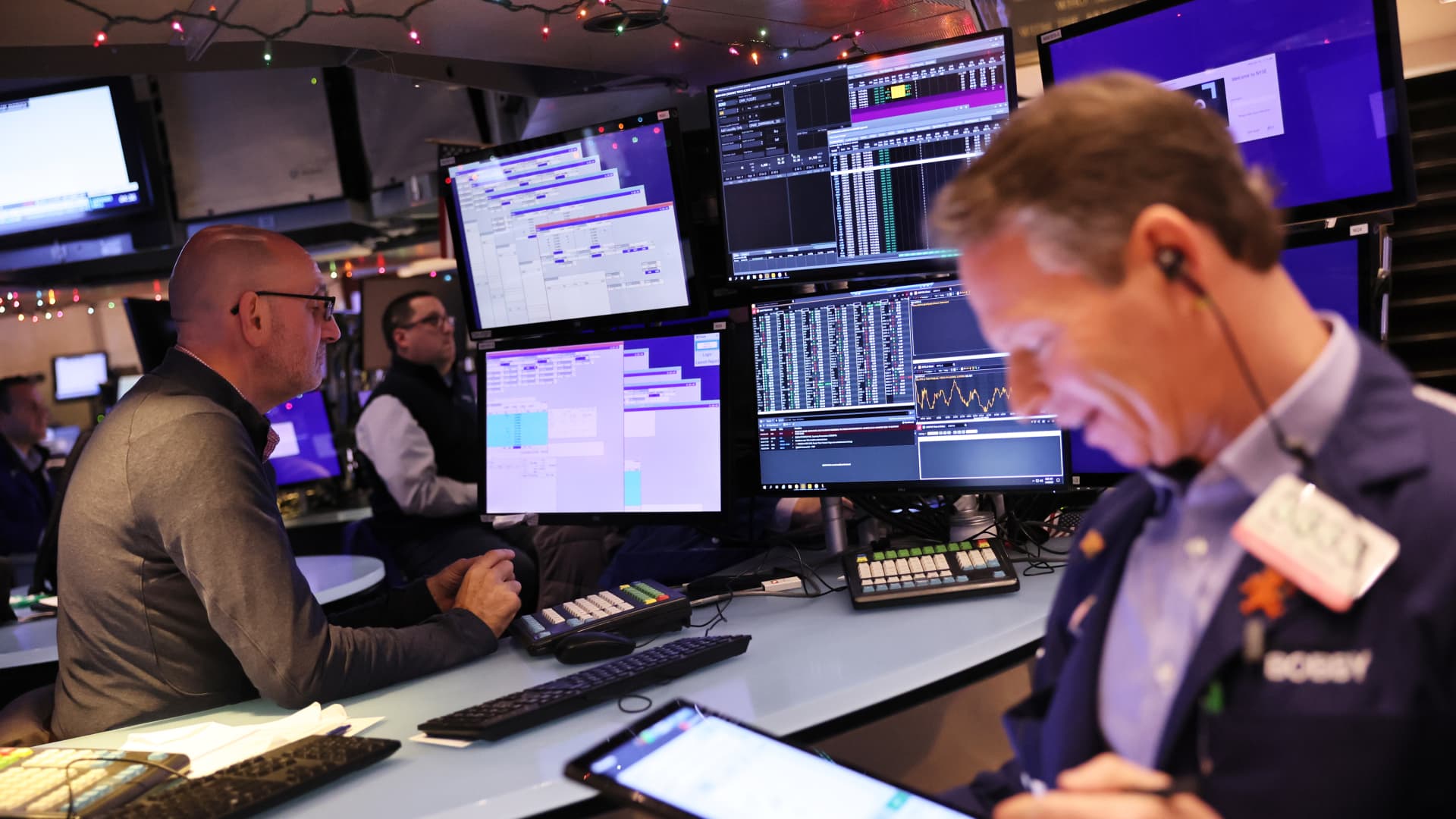Traders work on the floor of the New York Stock Exchange during morning trading on January 04, 2023 in New York City.
Michael M. Santiago | Getty Images
This report is from today’s CNBC Daily Open, our international markets newsletter. CNBC Daily Open brings investors up to speed on everything they need to know, no matter where they are. Like what you see? You can subscribe here.
What you need to know today
Market record highs
The S&P 500 and the Nasdaq Composite ended the session at all-time highs as investors waited for inflation data to assess the U.S. monetary policy path. Apple continued its winning streak with a fifth consecutive record close and Nvidia also saw gains. However, the Dow Jones Industrial Average dipped slightly. The yield on the 10-year Treasury was little changed, while U.S. oil prices fell as Tropical storm Beryl made landfall.
Elliott proxy fight threat
Activist investor Elliott Management has threatened a proxy fight with Southwest Airlines unless its board agreed to negotiate leadership changes. Elliott seeks to oust CEO Bob Jordan and Executive Chairman Gary Kelly, citing underperformance and cultural issues. The investor claims the board’s recent actions, including adopting a poison pill and expanding the board, are “entrenchment maneuvers.” While open to collaboration, Elliott plans to give shareholders a say in leadership changes if the board remains unresponsive.
Corning’s AI pop
Corning‘s stock surged 12% on Monday, its biggest jump since March 2020, after the company raised its second-quarter forecast. Corning attributed the growth to increased demand for its optical connectivity products, which support generative AI networks. “We’ve invented new fibers, new cables, new connectors and new custom integrated optical solutions to dramatically reduce installation costs, overall time and space and carbon footprint,” Corning CEO Wendell Weeks said on CNBC’s “Squawk Box.”
Germany’s bitcoin sell-off
The German government has been selling off hundreds of millions of dollars worth of bitcoin, contributing to the cryptocurrency’s recent price drop. Police in the eastern German state of Saxony seized close to 50,000 bitcoins in mid-January, worth about $2.2 billion at the time of the seizure. Despite selling $379 million worth of bitcoin in recent weeks, Germany’s Federal Criminal Police Office still holds roughly 32,488 bitcoins — worth around $1.9 billion at today’s prices.
Japan stocks hit record high
Japan’s export-heavy Nikkei 225 as well as the broader Topix hit record highs amid a broader rise in Asia-Pacific markets. Australia’s S&P/ASX 200 gained as business confidence in June rose, per National Australia Bank. South Korea’s Kospi edged up. Hong Kong’s Hang Seng index and mainland China’s CSI 300 rose 0.1% and 0.68%, respectively.
[PRO] AI bottleneck
There’s a bottleneck in data center expansion and the energy transition that could stall growth in Al and hinder efforts to reduce fossil fuel reliance. Here are some suggestions from analysts on how to play the sector.
The bottom line
As the S&P 500 continues to soar, hitting its 35th record high this year, Oppenheimer’s chief investment strategist, John Stolzfus, has raised his S&P 500 target to 5,900 — the second highest on Wall Street. Yet, a sense of caution is brewing. Goldman Sachs’ trader Scott Rubner is on alert for a market correction. He believes the market, including himself, is overly optimistic.
Rubner isn’t alone in his concerns. Investors are increasingly questioning the massive investments being poured into artificial intelligence. Roger McNamee, managing director of Elevation Partners, warned that investors may want to find a “safe place to land” as the end uses of AI may not justify the investment.
“Microsoft is investing, I think, roughly $10 billion a month in data centers and the industry is putting in about $15 billion. We need a number roughly close to $600 million of revenue to justify the amount of money that’s going in,” McNamee said.
“We are making assumptions about what this technology can do, that we haven’t proven, and we are applying it in places where it may not work. If that’s true, the mania is going to come to an end, and the largest stocks in the S&P 500 are all going to be heavily affected.”
Ed Yardeni, president of Yardeni Research, describes the market as being in a “slow-motion melt-up.” Investors seem to believe that the Federal Reserve will quickly lower interest rates if the economy significantly slows down or enters a recession, Yardeni said.
This week could offer more clarity on the market’s direction, with Federal Reserve Chairman Jerome Powell set to testify before Congress on Tuesday and Wednesday, and crucial inflation data due on Thursday, potentially influencing interest rate expectations.
Former Dallas Fed President Robert Kaplan expects the Fed to cut rates in September.
“If I were sitting in my former seat, I’d be getting ready to cut the rates in September,” Kaplan said Monday on CNBC’s “Squawk Box.” “I wouldn’t make any commitments between now and then, but I think they’re going to position to cut rates in September, and they’ll take it then one meeting at a time.”
— CNBC’s Jeff Cox, Brian Evans, Pia Singh, Scott Schnipper, Katie Bartlett, Ryan Browne, Fred Imbert, Spencer Kimball, Rohan Goswami, Weizhen Tan and Lee Ying Shan contributed to this report.
